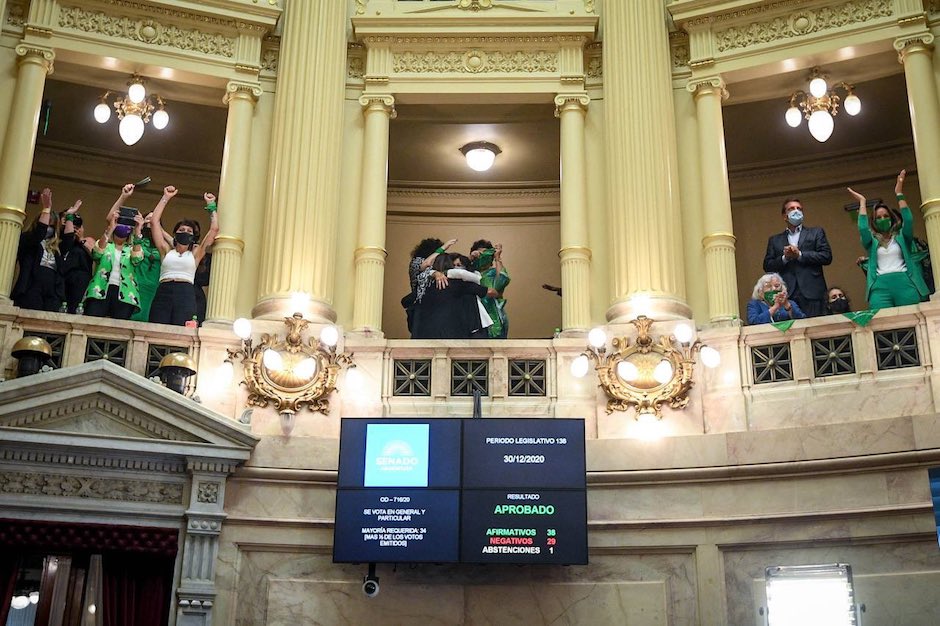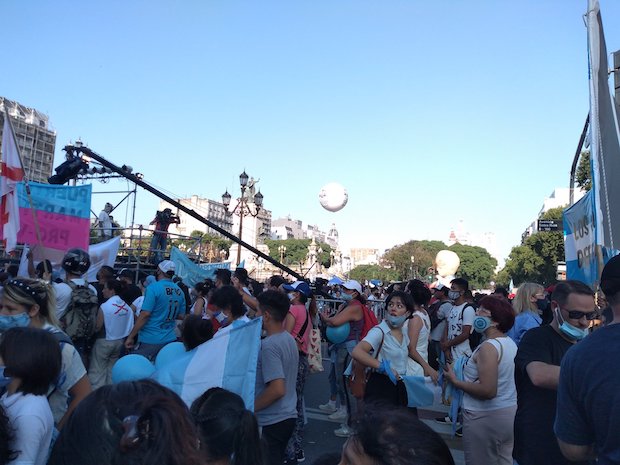The Senate ratified the law in a close vote. “Argentina has moved back centuries of respect for the supreme right to life”, evangelicals say.
 Pro-choice parliamentarians celebrate the approval inside the Senate building. / Twitter @SenadoArgentina..
Pro-choice parliamentarians celebrate the approval inside the Senate building. / Twitter @SenadoArgentina..
In a close vote (38 in favour, 29 against and one abstention), the Argentinian Senate ratified the legalization of abortion that the Parliament had already approved on December 12.
The law, which was presented to Parliament in November by President Alberto Fernández, passed on December, 30, barely two years after the last attempt to decriminalise abortion, which was finally rejected by the Senate in August 2018.
According to the new law, abortion is legal until the 14th week of pregnancy. From then on, it will be an option only for specific cases, as contemplated by the current law, such as rape or health risk for the mother and the foetus.
Girls under 16 will need to be accompanied. Furthermore, conscientious objection is permitted but the clinic is obliged to provide another professional or to refer the case to another centre.
Along with the law, the Senate has also approved the Thousand Days Plan, which provides for the payment of a universal child allowance for children under three.
“Safe, legal and free abortion is the law. Today we are a better society that extends rights to women and guarantees public health. I am Catholic but I have to govern for everyone”, President Fernandez said in his social media.
The Ibero-American Congress for Life and the Family regretted the approval of the law in a statement, denouncing that the president has pushed it through in the midst of the pandemic, “preventing an adequate social and political debate, imposing a controversial and delicate decision through the back door”.
The entity, which brings together a significant part of Latin America's evangelical leadership, had launched a campaign to claim “the two lives in Argentina” with mobilisations, prayer and fasting between 25 and 28 December. They had also sent a letter to Fernández encouraging him to consider “the legacy of his presidency”.

“With this decision, Argentina breaks the principle of conventionality by legislating against international treaties [...] it should be reviewed whether the government could be taken to the international courts because of this decision”, the statement said.
Furthermore, they call on the pro-life deputies to “challenge this law and demand a trial of unconstitutionality”. They also ask citizens who have spoken out against the law “not to become discouraged or stop fighting”.
“This battle has been biased by the presidential power that infiltrated the legislative power under threats, political pressure and even blackmail. Now we have to fight to restore the dignity of Congress”, they add.
The president of the Evangelical Baptist Confederation, Hugo Márquez, said that “with the Law on the Legal Termination of Pregnancy we are adding more pain to this 2020”.
The Christian Alliance of Evangelical Churches of Argentina (ACIERA) also regretted the decision, pointing out that “Argentina has moved back centuries of civilisation and respect for the supreme right to life”.
According to ACIERA, “the ‘light-blue kerchiefs’ (pro-life supporters) were not heard, much less taken into account. However, that immense mass of people who supports the two lives does not give up, we continue to stand, because our convictions do not change”.
“This time of discussion about the power of some over the life of others has once again shown the immense selfishness of human beings towards another helpless, innocent and vulnerable human being”, they concluded.

Las opiniones vertidas por nuestros colaboradores se realizan a nivel personal, pudiendo coincidir o no con la postura de la dirección de Protestante Digital.
Si quieres comentar o